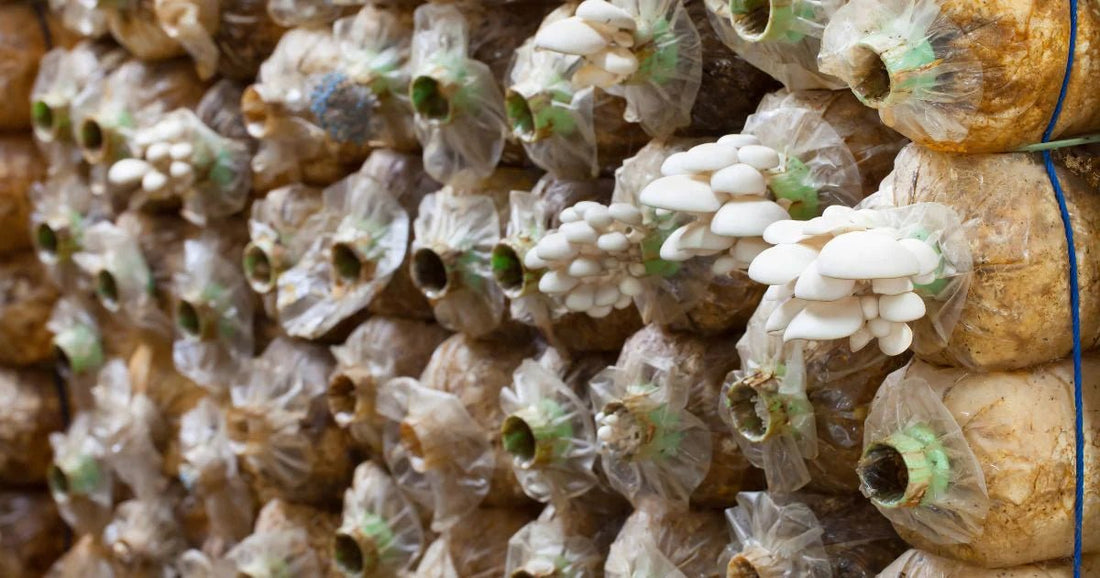
How important is measuring carbon dioxide in mushroom farming?
Just ask Diego Molina at Team AGROLAB in Guatemala. AGROLAB is a mushroom farm specializing in white caps, Portobello, Crimini, and Oyster mushrooms.
“We use portable CO2 meters every day at least 10 to 12 times a day. They are wonderful because you can move them from grow room to grow room and carry them with no problems at all.” Diego said.
Or ask Laurent Demuynck, a mushroom farmer who purchased portable CO2, temperature, and relative humidity monitors for his mushroom farm in Rwanda. The company cultivates Button, Cremini, Portobello, Oyster and Shiitake mushrooms. The farm in the north of the country produces five tons of mushrooms a week.
Is CO2 good for mushroom growth?
Carbon dioxide level control is a critical in mushroom farming. Along with darkness and humidity it is one of the most important factors in growth success. All must be tightly controlled during mushroom growth in order to obtain high-quality, large sizes and overall yield.
Most experts suggest CO2 levels between 10,000 - 20,000 ppm during the spawn run but no more than 1,000 ppm during the fruiting phase, preferably between 500 and 800ppm. If CO2 concentrations are higher than 1,000 ppm during fruiting, yields will decrease,
In addition, carbon dioxide monitoring is especially important during pinning. Mushrooms pin under high CO2 levels, then extend their stems to find oxygen. Too much CO2 as the pins grow results in "legging" or long stems, as the developing fruit pushes higher in the air to search for oxygen.
For example, early in pinning, most varieties of mushrooms require CO2 concentrations in the 1,200-1,500ppm CO2 range. This matches the higher than ambient air CO2 levels found in decaying matter on top of the soil surface.
 If the pin reaches 1cm in height, its full body should be equal in diameter. If the cap is smaller than the body, this indicates that the CO2 concentrations are too high and "legging" is occurring. Conversely, if the stems are too short the pins may have been introduced to low levels of CO2 too soon in their growth cycle. CO2Meter offers the CO2 Controller for Mushrooms to efficiently control the CO2 levels for mushroom environments, with easily customizable co2 settings from high to low. Equipped with a temperature, humidity, and 2 co2 sensors, you can monitor 2 zones at once.
If the pin reaches 1cm in height, its full body should be equal in diameter. If the cap is smaller than the body, this indicates that the CO2 concentrations are too high and "legging" is occurring. Conversely, if the stems are too short the pins may have been introduced to low levels of CO2 too soon in their growth cycle. CO2Meter offers the CO2 Controller for Mushrooms to efficiently control the CO2 levels for mushroom environments, with easily customizable co2 settings from high to low. Equipped with a temperature, humidity, and 2 co2 sensors, you can monitor 2 zones at once.
Understanding Mushroom Production
Mushrooms start out as mycelium, a branching, thread-like colony of fungus. The mycelium is grown in compost, which is why you often see mushrooms growing out of dead tree branches or logs on a forest floor. In order to propagate, the mycelium sense the right combination of temperature and moisture in the air to flower. The result is a mushroom.
Mushroom farming is the attempt to recreate the natural process of mycelium flowering on a commercial scale. When the mycelium is ready, the grower “shocks” the fungus by lowering the temperature of the air and compost, reducing the CO2 level, and increasing evaporation to encourage the growth of pins, some of which transform into fully-formed mushrooms.
Do Mushrooms Emit CO2?
Mushroom are the fruit of a fungus. All fungi require food, water and oxygen to grow. They are not plants that take in CO2 and produce oxygen. They respire like humans, taking up oxygen and producing carbon dioxide.
According to the American Mushroom Institute, all the emissions of CO2 from producing one pound of button mushrooms (compost, energy, etc.) results in about 0.7 pounds of CO2.
Monitoring CO2 Levels
After looking at several options for a portable CO2 meter, the team at AGROLAB chose a portable CO2 monitor, the CM-501 - CO2 Handheld Gas Detector.
“We have been using the CO2 meters for almost 2 years,” Diego said. “We could not be as efficient as we have been without these meters. They are easy to manage, they are strong, and the CO2, humidity and temperature readings are perfect.”
According to Molina, the workers in the farm walk through the grow rooms with the CO2 meters to see if any parts of the room have higher or lower CO2, humidity or temperature readings than desired. If they find a trouble spot, they can instantly correct any balance needed during the critical pinning phase.
“We could not manage our growing rooms without this tool,” Molina added.
Who would have guessed that an ingredient that so many of us enjoy on our meals, could have such a strenuous production cycle (over 13 weeks to be exact!) and all with the assistance of our favorite inert gas, Carbon Dioxide (CO2).
For those that are looking for further information on carbon dioxide solutions and implementing devices into your indoor grow environment contact us today.








